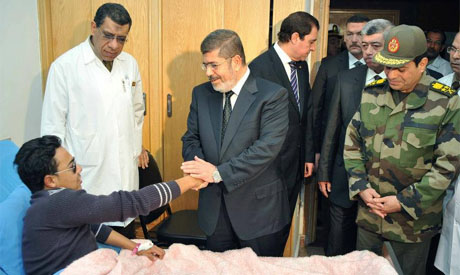
President Mohamed Morsi visiting one of the injured at Maadi Military hospital, 15 January 2013 (Photo courtesy of President Morsi's official Facebook page)
On Monday night, only minutes before the clock struck midnight, 19 Egyptian soldiers were killed and more than 120 injured in a massive railway accident – a scene that has become all too familiar in Egypt.
Five hours after the disaster, Prime Minister Hisham Qandil visited the accident site in Giza's town of Badrashin. Following the visit, Qandil expressed his sorrow and sent his condolences to the "sons of Egypt's military forces."
A few hours later, a military spokesman pointed out that those killed had not been members of the armed forces but rather Central Security Forces affiliated with the interior ministry.
By Tuesday afternoon, a corrected condolence letter was written and addressed to the right victims.
Political figures, including opposition leader Mohamed ElBaradei, saw the accident – and the government's reaction to it – as a failure of state management.
"The real tragedy of Egypt is not about the affiliation of its ruler, but about the inability to manage the country," ElBaradei said via Twitter.
Qandil's slow reaction stoked memories of last November's Assiut rail disaster in which 51 schoolchildren were killed.
At that time, too, there had been almost no response from the government for at least five hours. The president eventually issued a three-minute speech in which he promised that those responsible would be held accountable.
In response to the Assiut disaster, then-transportation minister Rashed El-Metiny tendered his resignation.
El-Metiny was succeeded by Mohamed Abdel-Latif, a Muslim Brotherhood member appointed in a 5 January partial cabinet reshuffle.
Abdel-Latif has called for the formation of a specialised committee to investigate Monday's accident and ensure that those responsible are adequately punished.
"We have to admit that the railway system is in a state of decay," Abdel-Latif told Al-Ahram's Arabic-language news website. "We will carry out investigations to know whether the accident was caused by technical defects in the train or the rails or by other reasons."
President Mohamed Morsi, for his part, took a military helicopter to visit the injured at Cairo's Maadi Military Hospital, where his predecessor – Hosni Mubarak – is currently receiving medical treatment.
During his visit, Morsi held a brief press conference in which he expressed his grief and promised that the injured would receive all necessary care.
Injured soldiers were sent to several other hospitals as well, including the Badrashin Hospital, Um Masryeen Hospital and the Hawamdiya Hospital.
"This is a sad day for every Egyptian. I send my condolences to the families of the martyrs who had been on their way to fulfil their national duty and my prayers go to the injured for a speedy recovery," said Morsi.
He added that an emergency meeting would be held later on Tuesday with the prime minister and transportation minister to discuss the government's reaction to the latest disaster.
Last November, Morsi was severely criticised for his slow reaction to the Assiut accident and was reminded by activists of his stance towards a similar accident in 2002 in Giza's Ayyat village in which 18 people were killed. Morsi, an MP at the time, had blasted Mubarak-era prime minister Atef Ebeid's slow response and ultimately held him responsible.
Since the 1990s, Egypt has been plagued by several spectacular railway disasters.
Saad El-Katatni, Muslim Brotherhood leader and head of the group's Freedom and Justice Party, saw Monday's accident as proof of the "almost total collapse" of Egypt's rail infrastructure during 30 years of Mubarak-era corruption.
Over the past decade, the Egyptian Railway Authority (ERA) – which answers to Egypt's transportation ministry – has suffered from serious budget deficits.
Egypt's 2012/13 state budget allocates LE5.3 billion to the ERA, for which LE4 billion in revenue has been forecast – which translates into a projected deficit of some LE1.2 billion.
Meanwhile, as private television channels rushed to cover the accident on Monday night, an old Egyptian film featuring renowned comedian Ismail Yassin played on national television.
Short link: